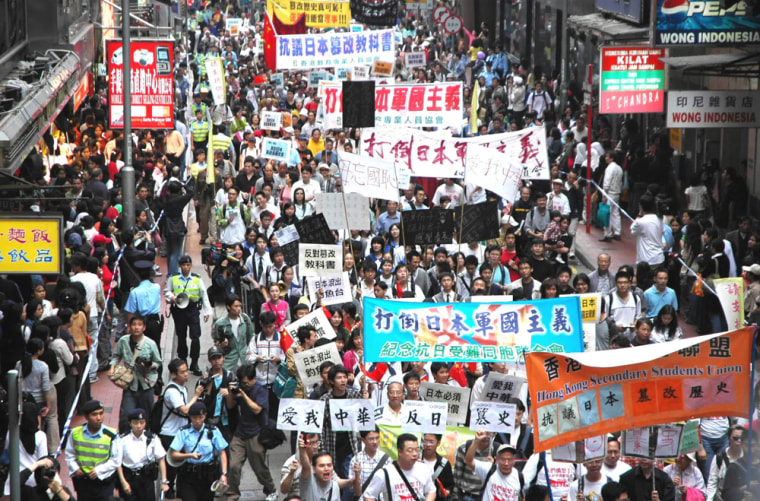China rebuffed demands for an apology on Sunday after rioters damaged Japanese diplomatic missions in protests over Japan’s wartime aggression and its bid for a U.N. Security Council seat, instead saying Tokyo had “hurt the feelings” of the Chinese people.
The two Asian powers traded blame over the aggression even as Chinese authorities allowed new protests in at least six cities.
“The Chinese government has never done anything that wronged the Japanese people,” Chinese Foreign Minister Li Zhaoxing told his Japanese counterpart, who flew to Beijing to protest the violence.
Instead, Li said, Japan was to blame for “a series of things that have hurt the feelings of the Chinese people” over issues such as relations with rival Taiwan and “the subject of history” — a reference to new Japanese history textbooks that critics say minimize Tokyo’s World War II-era atrocities.
Many Chinese believe Japan has never truly shown remorse for offenses committed during its invasion of China, including germ warfare experiments and sex slavery of thousands of women.
Lack of apology ‘very unfortunate’
Japanese Foreign Minister Nobutaka Machimura arrived with relations between the two nations at their lowest point in decades.
Ill will has been brewing over gas resources in disputed seas and Tokyo’s campaign to join China, Britain, France, Russia and the United States as a permanent member of an expanded U.N. Security Council.
Machimura called China’s failure to apologize “very unfortunate,” Japan’s Kyodo News agency reported.
“China’s top leaders seem not to understand the huge shock that the Japanese public has felt over this issue,” Machimura was quoted as saying.
Riotous protests
Tensions reached a boiling point after the Japanese government approved a junior high school textbook earlier this month that critics said tried to whitewash Japan’s wartime atrocities and justify its aggression in Asia in the first half of the 20th century.
On Saturday, police in Shanghai stood by as 20,000 protesters broke windows at the Japanese consulate, vandalized restaurants and damaged cars. Last week, protesters smashed windows at the Japanese Embassy in Beijing.
“We believe that the lack of adequate security measures was one of the main causes of this kind of damage,” Japanese Foreign Ministry spokesman Hatsuhisa Takashima said. “This kind of situation does not help in any way to improve relations between two countries.”
Beijing also was angered earlier this year when Japan and the United States appealed in a joint statement for a peaceful resolution of Taiwan’s future status. Tokyo had sought to avoid direct involvement in the dispute over the self-ruled island, which split with the communist mainland in 1949.
Backlash in Japan
In Tokyo, shots were fired Monday at a Chinese language school — the Japan-China Friendship Center — hitting a door but causing no injuries, in an apparent backlash against the anti-Japanese demonstrations, police said.
In China on Sunday, thousands of protesters in the southern cities of Shenzhen and Guangzhou called for a boycott of Japanese goods, said Chiharu Tsuruoka, Japan’s vice consul general in Guangzhou. Police stood guard outside Japan’s Guangzhou Consulate.
Smaller, peaceful rallies were held in nearby Dongguan and Zhuhai and in Chengdu in the west. In Shenyang in the northeast, about 1,000 protesters marched to the Japanese Consulate but were kept away by police. The crowd threw stones but did not break windows, said a consulate official, Shoji Dai.
The consulate in Shanghai also was ringed by hundreds of police, some armed with shields, but there was no sign of new protests. The consulate’s walls were splattered blue and black from paint bombs. A notice on the consulate Web site told Chinese visa applicants to stay away. Citing security concerns, it told them to apply through travel agents.
Machimura appealed to Li to protect Japanese diplomats and citizens.
“I wish the Chinese government would sincerely handle this matter under international regulations,” Machimura said, apparently referring to treaties that obligate Beijing to protect diplomatic missions.
Appeal for ‘social stability’
Some have suggested that Beijing permitted earlier protests to undermine Tokyo’s Security Council campaign. Beijing regards Tokyo as a rival for regional dominance and is unlikely to want to give up its status as the only Asian government with a permanent seat and veto power on the Security Council, which currently has 15 members.
But Beijing called last week for calm, apparently afraid of causing more damage to relations with Tokyo or encouraging others to take to the streets to demonstrate against corruption or demand political reforms.
The Communist Party newspaper People’s Daily called in a front-page editorial Sunday for the public to “maintain social stability.”
It didn’t mention the protests, but said “frictions and problems of various kinds ... can only be settled in an orderly manner by abiding by the law and with a sober mind.”
